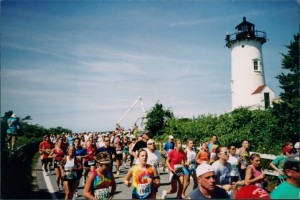
COURTESY PAUL CLERICI
Runners pass by Nobska Point Lighthouse in this photo by Paul Clerici, author of a new history of the Falmouth Road Race.
FALMOUTH – “It’s not just a race,” said Paul C. Clerici, whose new book is entitled “A History of the Falmouth Road Race: Running Cape Cod.”
One of the biggest events of the summer, the Falmouth Road Race takes place Sunday, August 16, and the town is already bustling with visitors from all over the world who come to town to take in the largest annual competition on Cape Cod.
This is the 43rd year of the famous 7.1-mile race.
The Falmouth Road Race was the idea of local bartender Tommy Leonard and it began as a race between two bars, the Captain Kidd in Woods Hole and the Brothers Four where Leonard worked in Falmouth Heights, Clerici said.
Over the decades of the race, it has become an international draw for world-class elite runners, including many from Kenya who have won the race in recent years. Yet it continues to attract average runners who come to raise money for charities or for the fellowship of being in a field of what has grown to almost 13,000 runners.
An estimated 75,000 people will line the route this year, and there are traditions for those people as well, with local watering stations and mini-concerts taking place at certain spots along the route every year run by successive generations of families.
Clerici said the race began at a time when running was growing in popularity and the new law known as Title IX that allowed women equal treatment in athletics was drawing more women into sports like running.
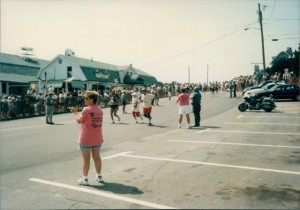
COURTESY PAUL CLERICI
The runners cruise the final downhill to the Falmouth Road Race finish line on Grand Avenue in this photo by road race history author Paul Clerici.
“You know you really can’t talk about the Falmouth Road Race without talking about Falmouth and Woods Hole and the Cape. They’re so intertwined. They kind of grew up together when road racing was just starting,” Clerici said.
The race has also become a tradition for the casual athlete and for families, both locals and those vacationing on the Cape, who turn the occasion into an opportunity to visit with loved ones.
Perhaps the longest tradition among running friends is held by the group of five men known as “The Falmouth Five” who have run every race since the first one. They plan their lives around the race, cutting short business meetings, in order to come to town early and have dinner with each other’s families, Clerici said.
But even the elite athletes consider the Falmouth race different, according to Clerici.
“It’s not just a race to them, and it’s not just a race to the average runner, us slow runners,” said Clerici, who has run the race several times himself. “You come here. You race the Falmouth Road Race but then you enjoy the area. You schedule your vacation so you make it a long weekend. You catch up with friends.”
Clerici said while he was researching his book, elite runners told him stories about time spent with their host families, picking blueberries, going fishing.
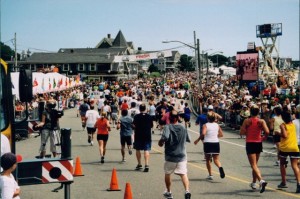
COURTESY PAUL CLERICI
Runners approaching the finish line in this photo by Paul Clerici
“Joan Benoit Samuelson goes for a swim down here. She’s from Maine, but she likes the water here,” he said of the gold medal-winning athlete who has won the women’s title in Falmouth six times. “Some elites say, ‘I have to get a lobster roll before I go home.’”
The social element of the race is a big part of it. People hold large house parties before and after the race and those events are a part of the weekend, he said. A couple of years ago, a couple even got married at the starting line, Clerici said.
Over the years, Clerici said, the race has fallen on every weekend in August. This year, it is being held the second weekend, on August 16.
But the very first Falmouth Road Race organized by Tommy Leonard was not held on a weekend at all.
“On a Wednesday afternoon on August 15, 1973, which was Tommy’s 40th birthday, in the middle of the week at noon in rain about 100 people showed up. They raised money, had a nice time, ran the race, went to the Brothers Four. That’s how it all started,” Clerici said.
The Brothers Four was a popular bar across from the Casino in Falmouth Heights. The bar was torn down and the property was turned into condominiums years ago. The Casino bar was also torn down and rebuilt as condominiums and a restaurant. But the race remains.
Leonard is now a bartender at the Quarterdeck on Main Street in Falmouth, but back then, he worked in the summers at the Brothers Four and in the winter at the Elliot Lounge in Boston.
The idea to hold the race, as Clerici tells it, came while Leonard tending bar and watching the 1972 Summer Olympics on television. He saw Frank Shorter win the marathon and he stopped serving drinks and said, “Wouldn’t it be great if Frank Shorter could run here in Falmouth?”
Within the following year, John Carroll, the coach of girls track at Falmouth High School, and his wife, Lucia, and Richard Sherman, who became the town’s recreation director, and his wife, Kathy, all moved to Falmouth, Clerici said.
Leonard found out from Carroll that the girls track team needed money to compete in other meets. So the race began as a fundraiser for the girls track team.
Over the years, Leonard had organized bar to bar road races for various charities in Boston with his friend Eddie Doyle, who was a bartender at the Bull and Finch Pub. Leonard along with the Carrolls and the Shermans organized the first Falmouth race in 1973.
But as the race has grown from 98 runners the first year to 12,800 this year, Clerici said, “It’s still maintained that small town, small village charm, even though it’s this global event and that’s a tough challenge to have.”
This year, the elite runners hit the road for the New Balance Falmouth Road Race at 9 a.m. in Woods Hole.
The race start time has moved earlier over the years to avoid the mid-day heat. It used to start at noon, Clerici said.
The wheelchair race this year starts at 8:40 a.m. Women elite runners start at 8:50 a.m.
After the race, a volunteer appreciation party is thrown for the couple thousand people, most who are local, who help with the race.
New this year, besides drug testing for the elite runners, is a bike valet and mobil locker room system so runners can hop on their bikes to use to get back to their cars at the end of the race.
Another new element this year is a countdown with a $5,000 bonus that is for the elite winners. The way it works is once the first woman crosses the finish line, a clock starts counting down a time determined in advance—this year it is about 4 minutes 28 seconds—and if the first man comes in within that time, he gets a bonus. If not, the woman gets the bonus.
Clerici said these are the kinds of small touches that make the Falmouth race special.
The race has grown into a weekend long event. The 25th Annual Falmouth Walk for local charities kicks off Saturday at 10 a.m. The Family Fun Run takes place Saturday at 5 p.m.
There is no Falmouth Mile featuring elite runners this year, but instead there is the Tommy Cochary High School Mile.
The High School Mile was created in 2010 and featured only athletes from schools located on Cape Cod, but in 2011 it was opened to athletes from across the state.
For the 5th year, the high school mile will be in memory of Tommy Cochary, a local Falmouth runner who was killed in 1990 in a drunk driving accident.
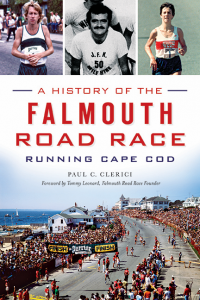
The cover of the new book about the Falmouth Road Race by Paul Clerici.
The Falmouth Road Race travels a particularly scenic route along the coastline from Woods Hole to Falmouth Heights.
“In the early years, people in boats in the water would be in Woods Hole and when the gun went off and the runners started going to Falmouth Heights, the boats would follow the runners,” Clerici said.
Before writing the book about the Falmouth race, Clerici, 49, wrote a book about the Boston Marathon, a race he has run 23 times. He has also run races all over the world and written about them. But the Falmouth Road Race stands apart with its scenic route, a part of the race that every runner enjoys.
“You can be running the race and you look to your right and there’s Vineyard Sound and boats cheering you on and then you see all the spectators, and then you see the lighthouse and you see the inner harbor and Surf Drive. It’s distracting in a good way if you’re having a tough race. It’s a beautiful, beautiful course,” he said.
By LAURA M. RECKFORD, CapeCod.com NewsCenter






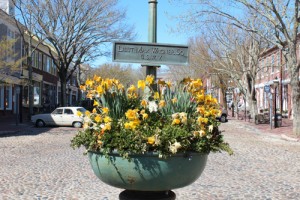

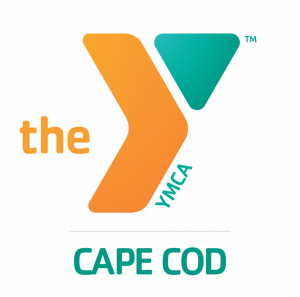















Speak Your Mind